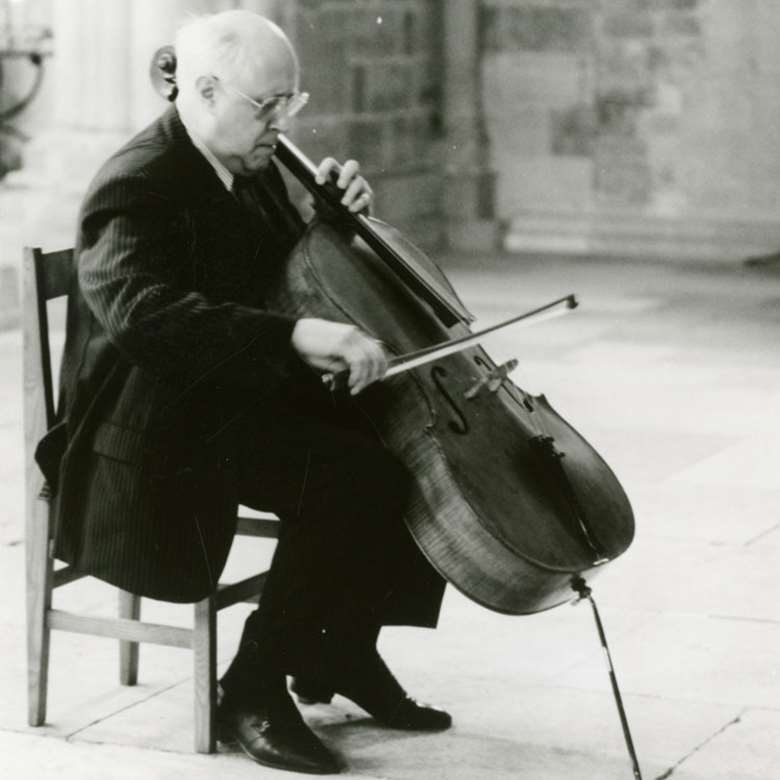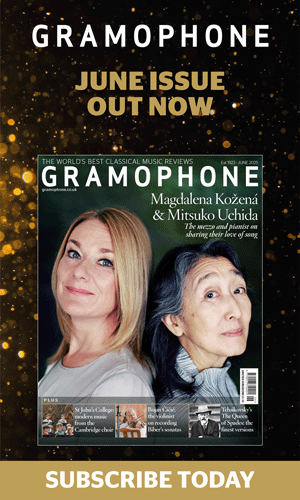Gramophone obituary: Mstislav Rostropovich
Tully Potter
Friday, February 24, 2017
Tully Potter pays tribute to the great cellist, Gramophone, July 2007

Suppose Mstislav Rostropovich – who died in Moscow on April 27, just a month after his 80th birthday – had never existed. How different would the pages of Gramophone be? I am not an angel called Clarence, and Rostropovich was not James Stewart, but I can propose a pretty amazing Russian version of It’s a Wonderful Life.
For a start, without Rostropovich we would not have myriad recordings by his fellow cellists. The tally of works he inspired or commissioned long ago passed the three-figure mark, and we would sadly miss the Sinfonia concertante and Sonata by Prokofiev, the Sonata by Myaskovsky, the two concertos by Shostakovich, the Cello Symphony, Sonata and three solo Suites by Britten, the Concerto, Partita and Suite by Boris Tchaikovsky, the Concerto-Rhapsody by Khachaturian, the Second Concerto by Penderecki, the Concerto da camera by Lopes-Graça, the concertos by Weinberg, Tishchenko, Bliss, Lutoslawski and Dutilleux, the Second Sonata by Schnittke, Le grand tango by Piazzolla, the Grand Duet by Ustvolskaya, Simi by Kancheli. The list is endless.
To all these works he brought heroic commitment. 'I work like a horse on Dutilleux,' he averred. Even Shostakovich’s Sonata, written when Rostropovich was hardly out of short trousers, would be different without him – after they had performed it together, the composer changed the tempo indications and metronome marks. Their joint interpretation was recorded and it still sets the benchmark, as does Rostropovich’s version of the Prokofiev Sonata with Sviatoslav Richter.
Rostropovich was born in Baku, Azerbaijan, and represented the third generation of cellists in a remarkable musical family. He studied with his father Leopold at the Central Music School and with his uncle Semyon Kozolupov at the Moscow Conservatory. Always in sympathy with musical outsiders, he befriended Prokofiev and Shostakovich and Solzhenitsyn. Exiled in 1974, he was eventually welcomed back; and he returned to Moscow to die.
My life would be the poorer had I never heard the whimsical way in which Rostropovich introduces the Scherzo of Beethoven’s Archduke, on the nonpareil recording with Emil Gilels and Leonid Kogan. That astonishing trio’s accounts of Haydn, Mozart, Schumann, Saint‑Saëns and Shostakovich should always be mentioned in the same breath as the records by Cortot, Thibaud and Casals.
The colossal personality of Rostropovich could shape a performance even from the second cello chair. Listen to the rhythmic kick he gives an all-star line-up in Tchaikovsky’s Souvenir de Florence. Or what about the magnificent recordings of the Schubert Quintet with the Taneyev and Melos Quartets? Peter Buck, cellist of the Melos, told me that Rostropovich arrived for their sessions at the last moment and had to borrow one of his bows. Yet the two readings are so similarly laid out, it must be the 'guest' who is setting the tone.
At the other extreme, he could quietly get on with breathing life into his relatively uninteresting part in a Haydn trio or a Mozart flute quartet, just for the pleasure of collaborating with Gilels, Kogan, Jean-Pierre Rampal, Isaac Stern or Alexander Schneider. Like Pinza singing Ferrando in Trovatore or Olivier playing Firs in The Cherry Orchard, he proved that there are no small roles, only small artists.
Of course there were gaps in his armoury. I regret his neglect of the greatest 20th-century solo Sonata. 'I never play Kodály,' he told me sadly. 'I have absolute pitch. For Kodály must change scordatura, impossible for me. I hear wrong note.' We have no Reger, Hindemith or Martinů from him, but perhaps he would not have found their wavelength. He got Schubert’s Arpeggione Sonata wrong, learning it to please Britten but missing its essential simplicity.
On the other hand, how good it is to have the Frank Bridge Sonata from him, and with Britten at the piano. Janáček’s Pohádka, too, in a live Aldeburgh performance.
Speaking of Britten, consider the influence of Rostropovich the pianist, in collaboration with his wife Galina Vishnevskaya. The Poet’s Echo is a fine song-cycle which will increase its reputation with the years. Imagine how Rostropovich had to graft, to master whole programmes of songs. 'I knew the repertoire very well but never play piano in it,' he said.
My touchstone for the great musical couple is their recording of Mussorgsky’s Songs and Dances of Death. 'Shostakovich made his orchestration after he heard us sing it,' Rostropovich remembered. 'It shows the genius of Shostakovich, like his orchestration of Khovanshchina. When I conducted it, I told him "I’m unhappy because in this time you could make your own opera".' Shostakovich wrote the Blok settings so Rostropovich could play cello in the trio accompanying his wife.
The obituaries have dwelt on Rostropovich the cellist, which is probably fair. But when the conductor was in full flow, he could be very impressive. I often come back to that 1973 performance of Shostakovich’s 14th Symphony with Vishnevskaya, Mark Reshetin and the Moscow Philharmonic. Rostropovich was perhaps not the man for Eugene Onegin but no one knew better than he how The Lady Macbeth of Mtsensk should go.
It was indeed a wonderful life, despite the political ups and downs, and in so many ways it made our lives wonderful too.








